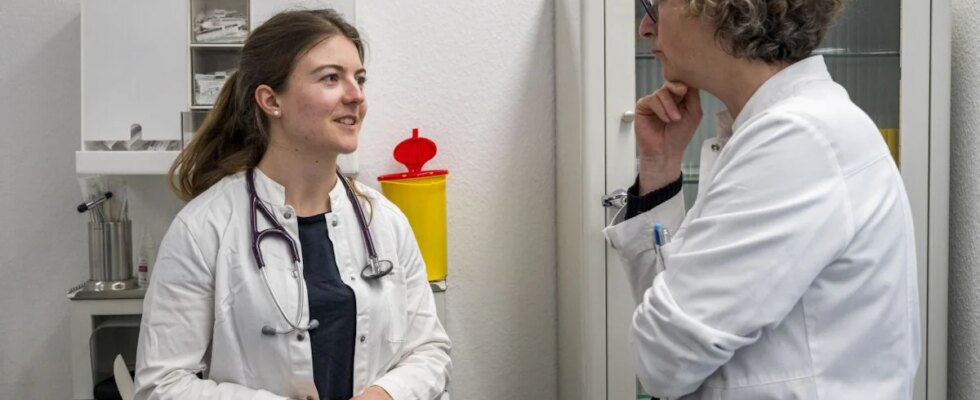For Fanny Bartsch it quickly became clear where the journey was headed. She wanted to be a family doctor. More precisely: a specialist in general medicine. “It’s important to me to be close to patients; that was one of the reasons why I studied medicine,” she says. The Hof district supported her on this path with a scholarship. Condition: She must work as a family doctor in the region for at least four years and must first complete her specialist training there.
The Hof district is an example of the state of primary care in rural Bavaria: even where there is still a good supply situation on paper, things are likely to become tight in the coming years. Because many rural doctors are close to retirement. And they can hardly find successors for their practices. The average age of general practitioners practicing in the Hof district is high, says District Administrator Oliver Bär (CSU). According to the district office, there are currently 113 general practitioners in the city and district, 55 of whom are already 60 years old or older.
Fanny Bartsch is currently completing her specialist training in Hofer Land. Katrin Schubert’s family doctor’s practice in Schwarzenbach an der Saale plays an important role in this. The tone is collegiately friendly, and Doctor Schubert is happy about the support of the young talent. The overall situation for general practitioners is difficult, says Schubert. If colleagues retired, the remaining practices would have to absorb this. Four years ago she expanded the practice to be able to work with other doctors. “That’s why we don’t currently have a stop to admissions.”
Five years ago, the Hof district installed the scholarship program for aspiring doctors. The municipality pays up to 25,200 euros in support over the course of the training. “It’s clear to us: If we want to have doctors, we have to drill hard,” says District Administrator Bär. After all, it takes around a decade for a promising medical student to become a family doctor.
But the district doesn’t just advertise with the scholarship; students can also get to know the region through various activities: leisure activities, professional opportunities, child care, cultural offerings. District Administrator Bär also knows that the municipality is not alone in attracting prospective doctors. You also need federal and state politics to do this. “We can only deliver one building block.” The scholarship program has now been expanded to include medical specialists. There are bottlenecks, for example, in the supply of pediatricians, says Bär. The average age is 60, and one seat is currently completely vacant. This shortage also affects family doctors, as Schubert says: If you can’t find a pediatrician for your offspring, you end up with a family doctor.
Fanny Bartsch herself already knows Schwarzenbach an der Saale well; she went to school here before studying medicine in Jena. She says she’s looking forward to working as a doctor here in the region soon: “I like the retreats, the forests, the peace and quiet.”
Medical associations in Bavaria support regional initiatives that recruit rural doctors. “The local search for young doctors who are willing to take over a practice is promising, usually when all local actors see this as a task for society as a whole. The municipalities play an important role here,” says Christian Pfeiffer, CEO the Association of Statutory Health Insurance Physicians (KVB) in Bavaria. “It takes teamwork from everyone involved,” as setting up a practice is comparable to setting up a medium-sized company.
Various funding opportunities have also been created in other regions, for example the Wunsiedel district has been offering scholarships for future rural doctors since 2021. The Free State already installed its Bavaria-wide rural doctor funding in 2012. Even where there is still a good level of care, there will be supply bottlenecks “in the near future” due to the age structure of family doctors, warns Beate Reinhardt, deputy chairwoman of the Bavarian Family Doctors Association.
As of February 2024, 470 contracted family doctor positions in Bavaria were not filled, as Pfeiffer explains. This means that the number of unfilled contract doctor positions in the general practitioner sector has continued to increase. The current number of graduates in medical studies is not sufficient to remedy the shortage, says Pfeiffer. The trend is also towards part-time employment. And: Many doctors did not want to set up their own practice, but rather wanted to be employed. In principle, it is urgently necessary to increase the number of study places for human medicine.
The General Practitioners’ Association, for example, welcomes the fact that the rural doctor quota in Bavaria not only includes high school graduates with particularly good grades, but also “selects specifically based on commitment, previous experience and motivation,” as Reinhardt says. This approach should generally be given more consideration: “Because good school grades alone do not make good doctors, skills such as empathy and pragmatism are also important.”

